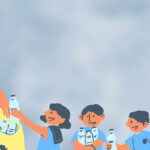Every bit of plastic we have ever encountered remains on the planet. It might be whole or crumbling, but it’s still there. Plastic debris may be found throughout, from the bottom of the sea to the highest mountain top. Every moment, more plastic makes its way. This is the condition that has pushed the plastic pollution catastrophe to the top of the international discussion. Once again, something with the potential to do good has become an unmanageable menace.
The majority of the microplastics that are flooding our dumps, choking streams, and invading the ocean are made up of abandoned objects and wrappers. Plastic may persist for centuries, slowly decomposing into tiny fragments but never completely decomposing. Indeed, one of the primary advantages of polyethylene is its durability. Despite this, practically every commodity we buy comes in plastic wrapping, and many plastic objects are designed to be thrown after sole use. Single-use disposable plastic is a paradox, yet it has become a tragic and more hazardous fact in our society.
Plastic pollution must enrage humanity. This is a catastrophe that we can witness with our own eyes every day. Even on the most distant, deserted islands and in the lowest reaches of the ocean, plastic has been discovered. We are more conscious of it because we can see it, as opposed to other types of contamination. We’ve witnessed the devastation caused by plastic on aquatic life. Birds and other marine species, for example, freeze to death because they are unable to digest swallowed plastic garbage bits. Sea turtles and other animals have become entangled in gill nets or become caught in plastic pack chains. Plastic pollution also harms the environment, obstructing ditches and prohibiting rainfall from sinking into the soil, resulting in floods. Land animals are also affected by plastic trash, with some becoming entangled in abandoned plastic bags and choking to death.
Plastic pollution has become that unavoidable reality that we cannot ignore. We have to battle it and devise a method to overcome this menace. Whatever steps we take, if its use of it is not fully boycotted, we and our environment will suffer.




